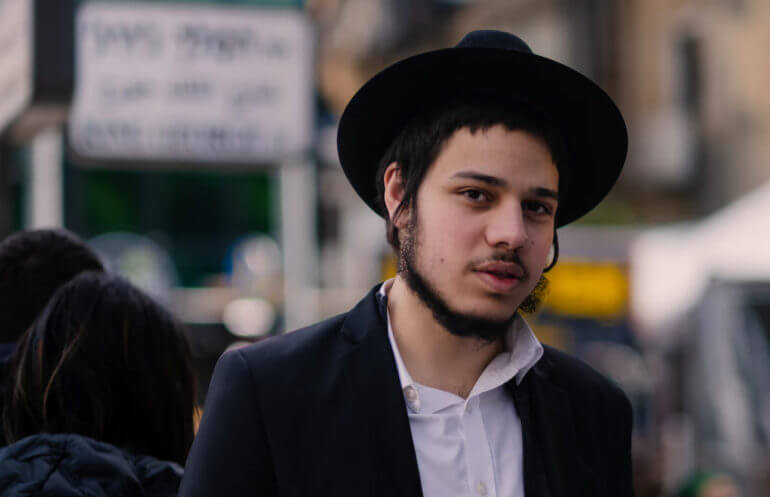
This Reform Rabbi’s Son Is Becoming an Orthodox Rabbi And Her Acceptance Is Something We Can All Learn From
The nine days are upon us, a period that comes with a strong intention to look inward and examine who we are, and how we can be better people to merit our eternal redemption. (No pressure).
In all seriousness, Tisha B’Av is the culmination of the three week mourning period, where we grieve over the destruction of both Holy Temples. The Second Temple, our sages say, was destroyed because of sinas chinam, or baseless hatred between Jews.
How do we counter that? Baseless love. Loving our fellow Jew just because they are family.
Of course, this is easier said than done. We all have our reasons for getting annoyed with someone, getting in a fight with another or really not liking a certain individual. They seem valid and feel so real. The challenge is working through those feelings in a healthy way that can ideally repair the relationship and move forward (in a relatively normal, not abusive situation).
All the more so when the person you’re having challenges with is a member of your immediate family. For Robyn Frisch, that person was her son. She describes her home as “liberal Jewish” and is ordained as a Reform rabbi while her husband is a Conservative rabbi. Her son decided to become a baal teshuva, who describes himself as Yeshivish Haredi and is pursuing ordination as well.
Frisch had major judgments to overcome parenting this son through his experience. She had to work very hard internally to not only retain a relationship with her son through this process, but push through the challenges that came up to make it stronger than ever.
Now, she’s sharing that message with others. “I consider myself the luckiest mother in the world,” she says. “It didn’t happen overnight and it was a long process to get here but if I had rejected my son’s choices, he would have walked out of the house at 18 and never turned back. How horrible would that be?”
To backtrack, when her son was a teenager, he started seeking out Orthodoxy on his own. To his parents’ credit, they raised a son who was persistent and curious and taught to think for himself. He was the one to reach out to Orthodox rabbis to mentor and guide him.
While he had been raised in a pluralistic day school, In high school, he wanted something more religious than his original school, so he found a coed yeshiva that separated girls and boys for Jewish studies. At the time, that was more religious than his parents were comfortable with, but eventually they relented. Soon, that didn’t feel like a good fit for him anymore so he switched to a more religious all-boys yeshiva called Mesivta, despite his parents initial objections as well. While he loved it and was happy there, he wanted to go even further with his Judaism and asked to go to Ner Yisrael, a yeshiva in Baltimore, for the next two years. Unsurprisingly, his parents said no to that in the beginning too, as he had to live there since it was far from home, but his persistence paid off. He studied there and then took a gap year at the Mir. Each time his parents gave more than they thought they could.
“As much as we missed him, I think those two years were so essential and critical for him,” Frish says. “Being a Baal Teshuva at such a young age, he learned so much and was able to live a life like many of his peers that grew up frum, and I think that’s really nice for him. He doesn’t have to feel different.”
Making the Switch Internally
“I always said I wanted my kids to be independent, but what I really meant was I want them to be independently making the choices in life that I made,” Frish notes.
It’s a compelling thought. If asked, we would all say that we want our children to be independent, of course. We want to raise people who think for themselves, make their own decisions and can stand strong on their own.
When they use those skills to do something different than we had imagined though, it’s tricky and can get really complicated. It’s a true test of parenting to be able to let them fly, love them fully and most importantly, be willing to bend yourself throughout the process if the relationship requires it.
Frisch says she learned so much from her own children throughout her son’s process of becoming religious. She strives to be a nonjudgmental person yet didn’t even realize her own judgment toward the Orthodox community until her son became a part of it.
“We sat our son down early and said, ‘Orthodox people can be really judgmental and we’re concerned you’re going to be judgmental of us,’” she shares. “He looked at us respectfully and said, ‘Do you know how judgemental you’ve been of me and everything I’ve done up until this point?’ We were dumbfounded because he was right.”
It was a conversation that forced Frisch to examine her own behaviors, and alter her own beliefs about a community that was only based on fear and the unknown.
“Seven years later, that conversation stays with me,” she says. “I realized that he’s choosing a different path, but it doesn’t mean he doesn’t love me or is rejecting me as a parent.”
It was something Frisch had to work on continuously, which of course is understandable. When you try to give your kids a life you believe is the best one and they choose a different one, it can create loads of insecurity. The most inspiring part about Frisch is she constantly examined her own behavior and made changes when she felt she needed to. She never let her ego get in the way and used her tremendous humility to grow into an even fuller, better person.
She shares that one night at dinner throughout this process she made a comment about her son’s Orthodoxy journey being a phase. Her other son looked at her and said, “Ima that’s not very nice. Even if it is a phase, no one wants to hear that something they’re doing and caring so deeply about isn’t who they are.”
“It was one of those times where you think, ‘Wow, they have a lot more wisdom than I do,’” she reflects. “I’m glad I started to treat him like this wasn’t a phase and this was who he was.”
The Dating Process
It’s one thing to accept your own child’s choices, but another when they bring a new member into the family. In-law relationships can be fraught with conflict, all the more so when they involve a whole different lifestyle.
Frisch and her daughter-in-law broke that mold though. It seems like a combination of effort, humility and love on both their parts.
For context, those in the Haredi community don’t typically date for that long. While it can range anywhere from a few weeks to a few months, decisions can sometimes be made in just a handful of dates.
Frisch’s son started dating a girl last June and by the third date said to his mother how much he liked her. At that point, she and her husband were actually about to board a plane to Israel for two and a half weeks. She joked to her husband, “He could be engaged when we get home.”
“I was half-kidding,” she says. But sure enough, two weeks in just before they came home she started to get phone calls from her son saying he wanted to propose. He explained that since she’s coming home on a Tuesday, she can come meet his future bride on Wednesday.
Frisch was nervous about her jetlag so asked if they could do Thursday. Well, his nerves got to him and sure enough, he proposed that Wednesday.
Another mother might feel hurt, or disappointed not having a chance to get to know her future daughter-in-law let alone meet her before the engagement happens, but there were no hard feelings at all.
That Thursday night, she went to her future daughter-in-law’s parents house for dinner. It turns out, her parents were Baalei Teshuva as well, so she has grandparents that aren’t religious that she’s very close to. That helped to calm Frisch’s nerves and explained they had a lovely time.
Her daughter-in-law’s spirit and energy really sealed in how special this relationship would come to be though. At the engagement party the following Sunday, Frisch walked in and saw her daughter-in-law surrounded by friends. “It was like the parting of the Red Sea.” She immediately went over to Frisch and asked if she could call her Ima, or mother in Hebrew.
“I’m going to cry thinking about it,” she says. “The fact that it didn’t matter that I wasn’t Orthodox — I was her Ima — meant the world to me. She has been wonderful…I now say to my son, ‘Hashem must really like you because you scored with this one.’”
People are People
Oftentimes, we let people’s externals determine who they are. Some may see a streimel and payos and think the worst about a person. Other people may see a Jewish woman not dressing modestly and judge in return. Those externals are simply that, external. They have nothing to do with the soul inside a person. If we got to know those souls, maybe we would connect.
Frisch explains that her son is still the same person he always was. Becoming religious doesn’t mean you lose that. “He’s a goofball,” she says. “I realized that just because someone is practicing religion differently doesn’t mean they’re a different person. That’s part of what I was so scared of and it was really empowering for me to see that we can have that shalom bayit.”
Of course, she doesn’t want to make light of the challenges that do occur, but wants to encourage those in similar situations, or any situation of conflict with someone they love, to approach it with curiosity instead of criticism.
When you don’t understand something, instead of being quick to judge, ask why they’re doing something different. It can open up a whole new perspective and most importantly, ease any fears and concerns instead of simply driving a wedge in the relationship over fear.
In a situation like this one, where a sibling or child becomes more religious, she suggests having as many open and honest conversations as you can. Since keeping kosher can be hard during family gatherings, ask what they’ll be comfortable with. Go shopping for items together, figure things out before you’re actually in the situation and things get more uncomfortable.
Further, she just reminds everyone to believe that each person is trying his or her best. When there’s love, no one wants to hurt another intentionally. Sometimes it can feel that way, but ultimately things can come out wrong or actions can be misinterpreted.
“I think what I’ve learned more than anything is it’s about the love you have for your child,” she explains. “I couldn’t say this seven years ago when it all began, but now I’m able to look back and say we’ve ended up in an amazing place. I love to use my family as an example of Klal Yisrael getting along.”
If you found this content meaningful and want to help further our mission through our Keter, Makom, and Tikun branches, please consider becoming a Change Maker today.








2 comments
Sort by
I’ve known Rabbi Robyn since she’s been 6 years old and this beautiful story is truly sweet Robyn. Thank you for sharing.
That was a beautiful interview. Thank you for getting that for us!